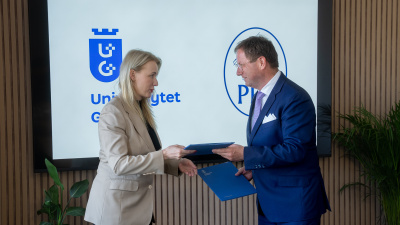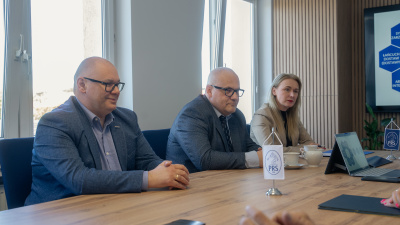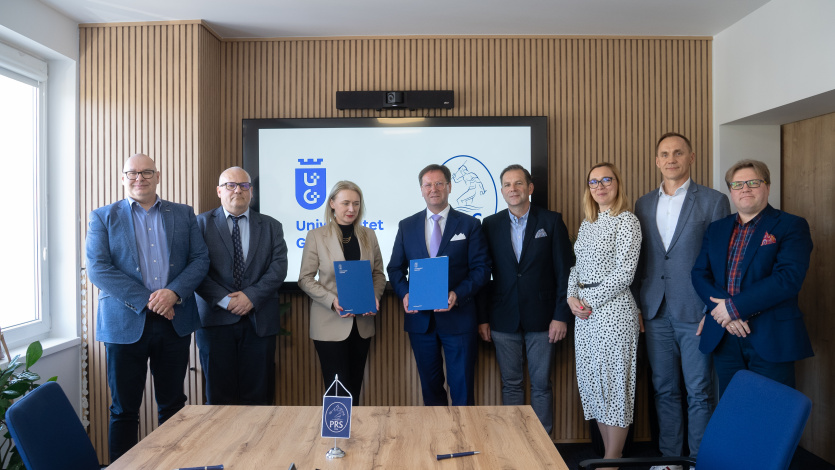
Cyber security, offshore wind energy, Polish nuclear power plants - these are just some of the areas that will be the subject of cooperation between the University of Gdańsk and the Polish Register of Shipping. The Memorandum of Understanding was signed on May 13 by the Vice-Rector for Cooperation and Development of the UG, dr hab. Sylwia Mrozowska, prof. UG, and the Acting President of PRS S.A. Jacek Witt.
‘In the agreement, we outlined broad fields for joint activities, while for today we have one priority. PRS, together with the Faculty of Mathematics, Physics and Computer Science, is initiating cooperation that would result in innovations in the field of cyber security, e.g. for the developing offshore wind energy sector,’ says prof. UG Sylwia Mrozowska. ‘Our cooperation, on the other hand, is multidimensional; we are also thinking about internships for our students and expert opinions and training for PRS S.A., which could be prepared by UG scientists.’
The subject of the cooperation agreement between UG and PRS is, among other things, cooperation in the development of tools for analysing and simulating the behaviour of vessels, installations and industrial equipment, as well as joint implementation of projects in the area of cyber security at sea and on land.
Important elements of the knowledge exchange will be student internships for full-time, part-time, and postgraduate students, cooperation in training organised by PRS and joint organisation of seminars and scientific conferences.
‘The agreement with the University of Gdańsk is primarily a supplement to those areas of our business offer that we would like to expand. These include activities related to the area of offshore wind energy or the construction of a nuclear power plant in our region. PRS, as a certification body, has great potential and experience to carry out these types of projects,’ says Jacek Witt. ‘On the other hand, the University of Gdańsk has a lot of experience when it comes to cyber-security, including several patents related to this sector.’
The signed agreement has taken on the character of real action, as evidenced by the invitation of another UG scientist to work on the Technical Council of the Polish Register of Shipping S.A. for the current term (2022-2026).
As part of the existing cooperation between the parties, an expert in maritime affairs, dr hab. Dorota Pyć, prof. UG, participates in the work of the aforementioned Council.
Soon, the second UG representative in the Council will be the Vice-Dean for Science of the Faculty of Mathematics, Physics and Informatics, dr hab. Marcin Marciniak, prof. UG. The University of Gdańsk scientist will be responsible for coordinating the cooperation dimension related to cyber security.

From left: Director of Office of Analysis and Expertise dr Sebastian Susmarski, prof. UG Marcin Marciniak, prof. UG Sylwia Mrozowska
‘We are the market leader in quantum technologies. Our university employs leading scientists in the field of quantum information theory, who are developing, among other things, new methods of security, the so-called quantum cybersecurity,' said prof. UG Marcin Marciniak. This means a completely new philosophy of building encryption algorithms that are resistant to classical hacking attacks. Such safeguards are crucial to protect systems related to, for example, offshore wind energy, which are attractive to hackers.
The Polish Ship Register is making efforts to join the so-called 'nuclear island' ecosystem project as part of the construction of the Pomeranian Nuclear Power Plant. As the company's experts from the Industrial Supervision Division argued, the safety dimension should be considered in a broader context, taking into account unforeseen events. The role of PRS has been declared in the area of technical advice for the auxiliary infrastructure of the nuclear power plant.
Therefore, today's agreement offers a real prospect of synergistic action by the parties to the agreement, providing an opportunity for a deeper analysis of the cybersecurity domain. These collective actions will undoubtedly improve security in the area of the booming renewable energy market in the face of a rising tide of incidents and cyber attacks targeting the country's critical infrastructure.

